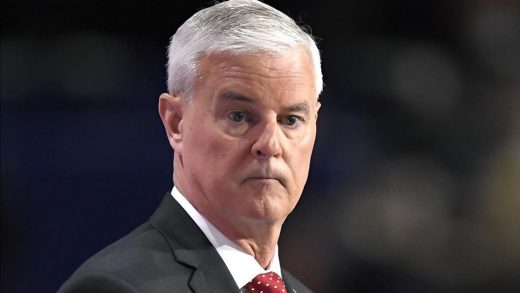:format(webp)/https://www.thestar.com/content/dam/thestar/entertainment/opinion/2023/05/03/smarten-up-hollywood-stop-treating-writers-like-second-class-citizens/writer_strike_hollywood.jpg)
Someone should write a movie about how Hollywood never learns.
There would be no TV shows or films without writers, those slobby weirdos with wild imaginations, terrible sleep hygiene and a love of story and language. Without his writing staff, as Stephen Colbert quipped this week, “this show would be called ‘The Late Show With a Guy Rambling About Lord of the Rings and Boats for an Hour.’”
Colbert is now off the air. As is every late-night comedy.
I better find my old Johnny Carson DVD box-set.
Just after midnight on Tuesday, the Writers Guild of America (WGA) went on strike, the first work stoppage since 2007. The guild is seeking higher wages for its 11,500 members, enhanced job security and benefits, a bigger slice of the residuals pie, protections from the possible incursion of AI and, overall, just to be treated fairly.
In turn, the Alliance of Motion Picture and Television Producers, which represents the big networks and studios, said it is willing to throw a few more bucks at the scribblers. But other demands, including calls for a mandatory number of writers on a production, were a no-go. So now Hollywood is on strike.
And if this drags on, it could inflict carnage on both sides.
Analysts and investors will argue now is not the time to reinvent any labour wheels inside Tinseltown. Network advertising is in free fall. Streaming is the dominant form of distribution, an epochal shift. Status quo is prudent until revenue models can be time-tested. And if every soap opera is shuttered within a month, if Marvel must delay pre-production on its next superhero extravaganza, so be it.
But this week’s strike is about more than Hollywood struggling with change. It’s also about what has not changed — writers are still treated like second-class citizens.
Nuke the storyboards on “Succession,” for example, and all you have left is a moody improv without plot lines and narrative arcs that may or may not be inspired by Fox News. The problem? Writers get zero hoopla. They are taken for granted.
We lavish praise on directors as the creative masterminds. We idolize actors. But without the scripts, there is nothing to be shot. Or as the sign of one striking writer on the picket line put it this week: “You want pages? Give us better wages!”
I’m not a fan of placard rhyming. But her sentiment is reasonable. If Robert Downey Jr. can land $20 mil for a role, the people who crafted the lines tumbling out of his lips should not be forced to contemplate side hustles at Skip the Dishes in between writing jobs. Hollywood writers are like the bean farmers that supply Starbucks: they are anonymous, hard-working and without them there is no coffee for anyone.
But inside popular culture, Hollywood writers are invisible. They toil at keyboards behind mahogany doors, breaking stories and bingeing empty calories. They see their loved ones less than we see our dentists. There are no red carpets for the storytellers. When is the last time Entertainment Tonight took cameras into a writers’ room?
Steven Zaillian penned “Moneyball,” “Schindler’s List” and “Gangs of New York.” My spell check just underlined his surname. It doesn’t recognize him.
And neither would you if he was standing in line at Pottery Barn.
In a statement, the WGA said: “The companies’ behaviour has created a gig economy inside a union workforce, and their immovable stance in this negotiation has betrayed a commitment to further devaluing the profession of writing.”
Both sides will now duke it out in the press release trenches. But it’s hard to argue with the idea that Hollywood might secretly be keen to embrace a gig economy. Or that writers are seen as replaceable worker bees in a buzzing dream factory.
In the short-term, this strike is unlikely to affect scripted television and films this summer. Most of that content is already in the can. The strike that started in 2007 lasted 100 days. Yes, a weeks-long strike this time could delay new content. But given TV hiatuses and the fact most films have post-shooting calendars of about a year prior to release dates, viewers beyond late-night comedy and soaps are unlikely to notice any disruption to regularly scheduled programming until around Christmas.
But instead of getting lost in the negotiating weeds during this strike, instead of crunching streaming numbers or making gloomy profit projections, the studios should ask why they find it impossible to treat writers with respect. I have friends who are Hollywood screenwriters and some of the stories they tell me are peak bananas.
Writers are the engine of content. They should not be begging for gas money.
Streaming has basically cut seasonal episode counts from about 22 in the old network days to an average of 8-12 today. If a writer is paid per episode, that means his or her annual income just got cut in half. Jerry Seinfeld has so many Porsches, he could drive a different one seven days a week until 2033. He can indulge this fetish for fine German engineering with residuals from “Seinfeld.” Meanwhile, most of the people who wrote episodes of that sitcom are probably now tooling around in Subarus.
Hollywood has a hierarchy problem. Hollywood has a priorities problem. And until writers are no longer second-class citizens, Hollywood will have a strike problem.
JOIN THE CONVERSATION
does not endorse these opinions.



